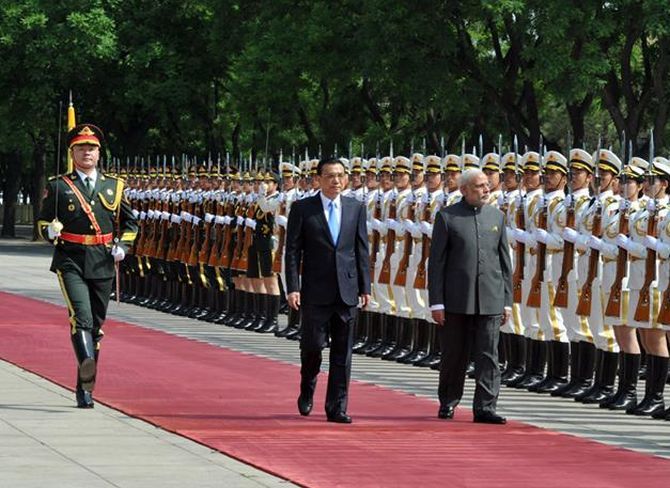
Narendra Modi appears to have gone beyond the cautious approach usually advocated by the tightly-knit 'China group' at the ministry of external affairs in dealing with Beijing, says Nitin A Gokhale.
Prime Minister Narendra Modi appears to have gone beyond the cautious approach usually advocated by the tightly-knit 'China group,' an informal team of Sinologists at India's ministry of external affairs in dealing with Beijing during his China tour.
In reminding the Chinese that there are 'complex' issues 'holding back relations,' Modi was more than candid. He said in Premier Li Keqiang's presence: 'I stressed the need for China to reconsider its approach on some of the issues that hold us back from realising full potential of our partnership. I suggested that China should take a strategic and long-term view of our relations.'
Usually, Indian leaders do not speak with such frankness, largely preferring to be diplomatic, an approach preferred by MEA mandarins.
The prime minister then reiterated his desire for a quick solution during his address at Tsinghua University. There he said: 'Yet, if we have to realise the extraordinary potential of our partnership, we must also address the issues that lead to hesitation and doubts, even distrust, in our relationship. First, we must try to settle the boundary question quickly.'
Even the joint statement reflected a subtle shift in how New Delhi and Beijing look at the boundary issue now. Part of the statement said: 'The two sides affirmed that an early settlement of the boundary question serves the basic interests of the two countries and should be pursued as a strategic objective by the two governments. Bearing in mind the overall bilateral relations and the long-term interests of the two peoples, the two sides are determined to actively seek a political settlement of the boundary question.'
Premier Li, in his written interview to India Today just before Modi's trip began, also spoke about the need to speedily settle the border. 'The boundary question is left over from history, and is a difficult question in bilateral relations. To settle the question as early as possible is the historical responsibility that falls on both governments...'
This is an important shift from what was said in Bejing in October 2013 when the Border Defence Cooperation Agreement was signed. That time, both sides were mostly talking about keeping the border quiet and finalising the framework for the boundary settlement.
Part of the joint statement that time said: 'Special Representatives, who have been charged with exploring a framework of settlement of the India-China boundary question, were encouraged by the two leaders to continue their efforts in that direction. Peace and tranquility on the India-China border was recognised as an important guarantor for the development and continued growth of bilateral relations.'
Another instance of the prime minister's bold initiative was his decision to allow e-visas to Chinese citizens wishing to travel to India. Modi appears to have taken a calculated risk in this matter although the security agencies and even the MEA appeared to have had reservations on this move.
The prime minister has been criticised by hardliners for not linking the decision of e-visas to the resolution of 'stapled visa' that the Chinese occasionally issue to residents of J&K and Arunachal Pradesh.
However, the Prime Minister's Office looks to have decided to put greater emphasise on people-to-people contact between India and China. Pointing out that 'Indians and Chinese don't know each other well, much less understand each other,' Modi has taken a big step forward in correcting this shortcoming.
Moreover, by reaffirming the demand for clarification of the Line of Actual Control, India is adopting a similar tactic as the Chinese who stick to their stand irrespective of the response from the other side.
Modi had made this suggestion for the first time last September when President Xi Jinping was in India. Beijing has not responded to the idea yet. By once again raising the point, New Delhi has now put the ball in China's court. If the Chinese don't respond, then the border talks will continue to stagnate.
Similarly, for the first time both sides have acknowledged their role in the larger international context. 'The leaders agreed that simultaneous re-emergence of India and China as two major powers in the region and the world offers a momentous opportunity for realisation of the Asian Century. They noted that India-China bilateral relations are poised to play a defining role in the 21st century in Asia and indeed, globally.'
In conclusion, a more confident New Delhi and an already assertive Beijing, currently led by two strong and nationalist leaders are willing to play a more proactive role in world affairs, their divergent views on some issues notwithstanding.
Image: Prime Minister Narendra Modi inspects a guard of honour in Beijing.
Nitin A Gokhale is a national security analyst, media trainer and author.










